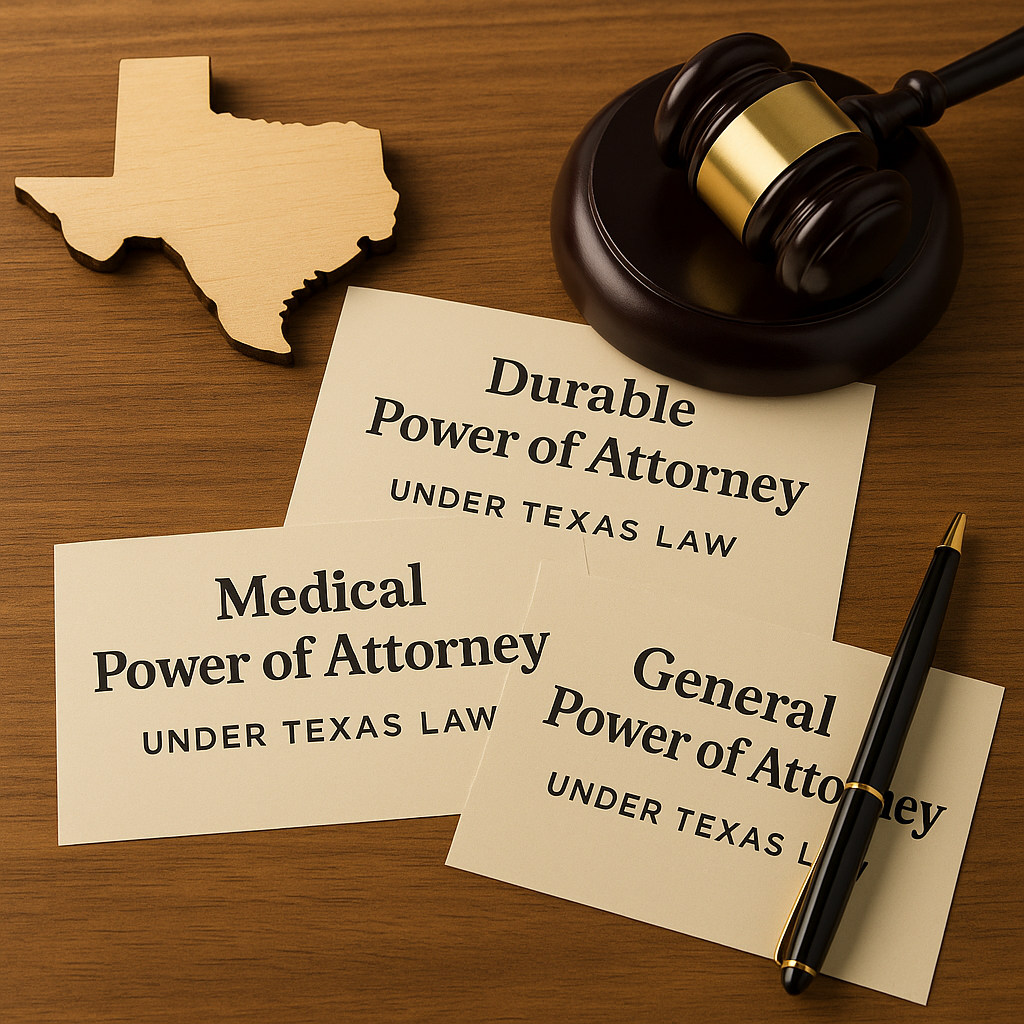
Powers of attorney are a vital tool in Texas law, allowing individuals (called “principals”) to authorize another person (called an “agent” or “attorney-in-fact”) to act on their behalf. These legal instruments are recognized under the Texas Estates Code and the Texas Health and Safety Code, depending on their purpose. While they are powerful documents, it is important to understand their scope, their limits, and most importantly, that all powers of attorney terminate at the principal’s death—even so-called “durable” ones.
Types of Powers of Attorney in Texas
1. Durable Power of Attorney
- Governing law: Texas Estates Code, Chapter 751.
- Purpose: Authorizes an agent to handle financial and business matters, such as paying bills, managing bank accounts, filing taxes, or signing contracts.
- Durability: It remains effective even if the principal becomes incapacitated. However, it ends automatically at the principal’s death.
2. Medical Power of Attorney
- Governing law: Texas Health and Safety Code, Chapter 166, Subchapter D.
- Purpose: Allows an agent to make healthcare decisions on behalf of the principal if the principal becomes unable to do so. This can include decisions about surgeries, treatments, or medications.
- Limits: It cannot override the wishes expressed in an advance directive (“living will”) or be used while the principal can still make their own medical decisions.
3. General Power of Attorney
- Governing law: Texas Estates Code, Chapter 752.
- Purpose: Grants broad powers to act on the principal’s behalf in financial and business matters.
- Limits: Unlike a durable power of attorney, it becomes ineffective if the principal becomes incapacitated. And, like all POAs, it ends at death.
4. Limited or Special Power of Attorney
- Governing law: Texas Estates Code, generally under Chapter 752.
- Purpose: Gives authority for a specific transaction or for a limited time period. For example, authorizing someone to sign documents at a real estate closing when the principal is out of town.
- Limits: Authority is restricted by the scope of the document and ends once the specific task or timeframe is complete—or at death.
5. Springing Power of Attorney
- Governing law: Texas Estates Code, Chapter 751.
- Purpose: Becomes effective only upon the occurrence of a specific event, most commonly the principal’s incapacity.
- Limits: It can create uncertainty, since third parties may require proof that the condition (such as incapacity) has occurred before honoring it. Like all others, it terminates at death.
The Common Rule: All Powers of Attorney End at Death
No matter what type of power of attorney is used—durable, medical, general, or limited—it cannot be used once the principal dies. At that point, the authority to manage the principal’s affairs shifts to the executor or administrator of the estate under the Texas Estates Code.
This rule prevents confusion and ensures that property and medical decisions after death are handled according to the law of estates and probate, rather than through a prior delegation of authority.
Key Takeaways
- Texas recognizes several types of powers of attorney, each with specific purposes and governed by state statutes.
- Durable powers of attorney remain valid through incapacity, but not death.
- Medical powers of attorney are controlled by the Health and Safety Code and are limited to healthcare decisions.
- All powers of attorney, regardless of type, terminate at the moment of death.
Powers of attorney are invaluable planning tools for Texans, but they are not substitutes for wills, trusts, or other estate planning documents. To ensure a seamless transition of authority during both incapacity and after death, it’s wise to work with an attorney experienced in Texas estate and probate law.
At David C. Barsalou, Attorney at Law, PLLC, we help clients navigate business, family, tax, estate planning, and real estate matters ranging from document drafting to litigation with clarity and confidence. If you’d like guidance on your situation, schedule a consultation today. Call us at (713) 397-4678, email barsalou.law@gmail.com, or reach us through our Contact Page. We’re here to help you take the next step.